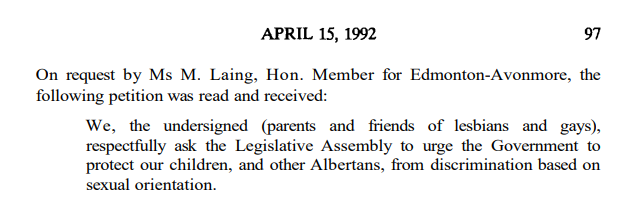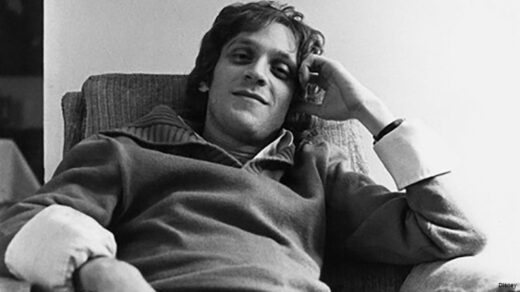The Individual’s Rights Protection Act and the LGBTQ Community
On January 9, 1992, The Alberta Human Rights Commission (AHRC) called on the Government of Alberta to open the Individual’s Rights Protection Act (IRPA) to include sexual orientation as a protected ground. The Commission reached its decision unanimously.
As the author has noted below they met with “a very officious senior official who explained that they had decided to cancel the project.” The study was buried and was never seen by the public. It would take another few years and Delwin Vriend to finally enact the changes needed.
We have the study now out in the open for all to see.
Rainbow Story Hub
I was working in the jewellery business when my friend Trevor Edwards contacted me and asked if I’d be interested in taking part in a 6-month study by the Alberta Human Rights Commission, that Fil Fraser (the Chief Commissioner) had authorized.
It blew me away, when he explained that they wanted to take in complaints from members of the LGBTQ community (they called it “the gay community” back then), as though we were covered by the act so that they could get some kind of indication of what the case load would be.

FOURTH SESSION OF THE TWENTY-SECOND LEGISLATURE OF THE PROVINCE OF ALBERTA
1992-1993
Today, I see that as “we’d like to see what would happen IF you had equal rights..” So strange to think that way. And here we are today, having to make sure we don’t backslide. Been there, done that, not going back!
I said sure and we met at the Commission. They were letting us use some office space, providing stationery and a bit of office support. This sentence would become important a short while after that. They taught us how the phone and intake system worked, and the lines were opened.
When calls started coming in I got knocked off my privileged upbringing, hearing about when people were getting refused service in establishments, experiencing discrimination, violence and more.
Shortly after we started, I was introduced to Mary Crunkilton who, Trevor explained, was a professional editor and sadly was suffering from terminal cancer. She said she wanted to contribute to something she felt was important.
Now, comes the part about resources I referred to earlier. Trevor mentioned that some of the alt-right media and other groups might call and try to get information that they could use on the project. I personally received a couple. One local magazine called and the “friendly sounding” person was being complimentary about the work we were doing. He then said “this important work is worth whatever they’re paying you…“ (nice leading question). I explained that the project is 100% volunteer-run, and nobody was getting paid.
A few times we also were asked why we are trying to get “special rights”… on the occasional phone call. I got to experience what other people who were deep in the work for equality experienced all the time. At first it was upsetting, but after discussing it with Trevor and Mary, we slotted the comments into the category they belonged in, and kept working.
Back in the 80’s during the time of the Conservative government of Alberta, it wasn’t like today. Back then, most of us would be in the closet (at least at work). You could lose your job, and even become a victim of violence. Those were the days when a “Pride March” was a scary thing to be in.
Kudos to those who were still willing to share their experiences with our study. Particularly after we had to say “this issue wouldn’t be actually covered by the Individual Rights Protection Act (IRPA), but with them sharing it, we can gather data that can be used. Or, in a conservative government at least form some kind of a permanent record of what had been said.
For months we gathered complaints and after a while I started finding the often-terrible stories taxing, particularly since we had to acknowledge that the study was just that – a study. Any impact (if it had any) would be long-term as part of a growing mass of evidence. Nobody who called would actually get helped themselves. However, back then our community was mostly used to not receiving much in the way of support from government or society anyway.
As the end of the study was coming closer, we began the work of summing things up, final editing, and then it was produced and bound. We had been pretty efficient, so we were ready about a day early. The copies were sent to the various stakeholders that Trevor had in a list.
Interestingly, the next day we were called to an office and were addressed by a very officious senior official who explained that they had decided to cancel the project. What a surprise. We explained that due to being efficient, we’d completed the study a day early and had produced and distributed it. She was clearly not happy with that, but it was too late – the copies we’d made (not a lot) had left.
I happened to have one, which I talked about with our friend Michael Phair at dinner one night and he had a look at it. He had it placed in the City of Edmonton Archives, where it still is.
I have provided a pdf copy of it which can be downloaded to read yourself. Please click this link where this site has a copy you can read or download.
https://yegqueerhistory.ca/a-study-of-discrimination-based-on-sexual-orientation/
I’m the sole survivor of that group, as Trevor sadly passed away from complications due to HIV and Mary’s cancer finally became terminal. I take some solace knowing that they both got to see the final product that they created, as an early step toward equality.
Recent events in Alberta tell me that our work is definitely not over.
David Lee
Spread the word! Share this now
Actual Story on YEGQueerhistory.ca
Author: David Lee




